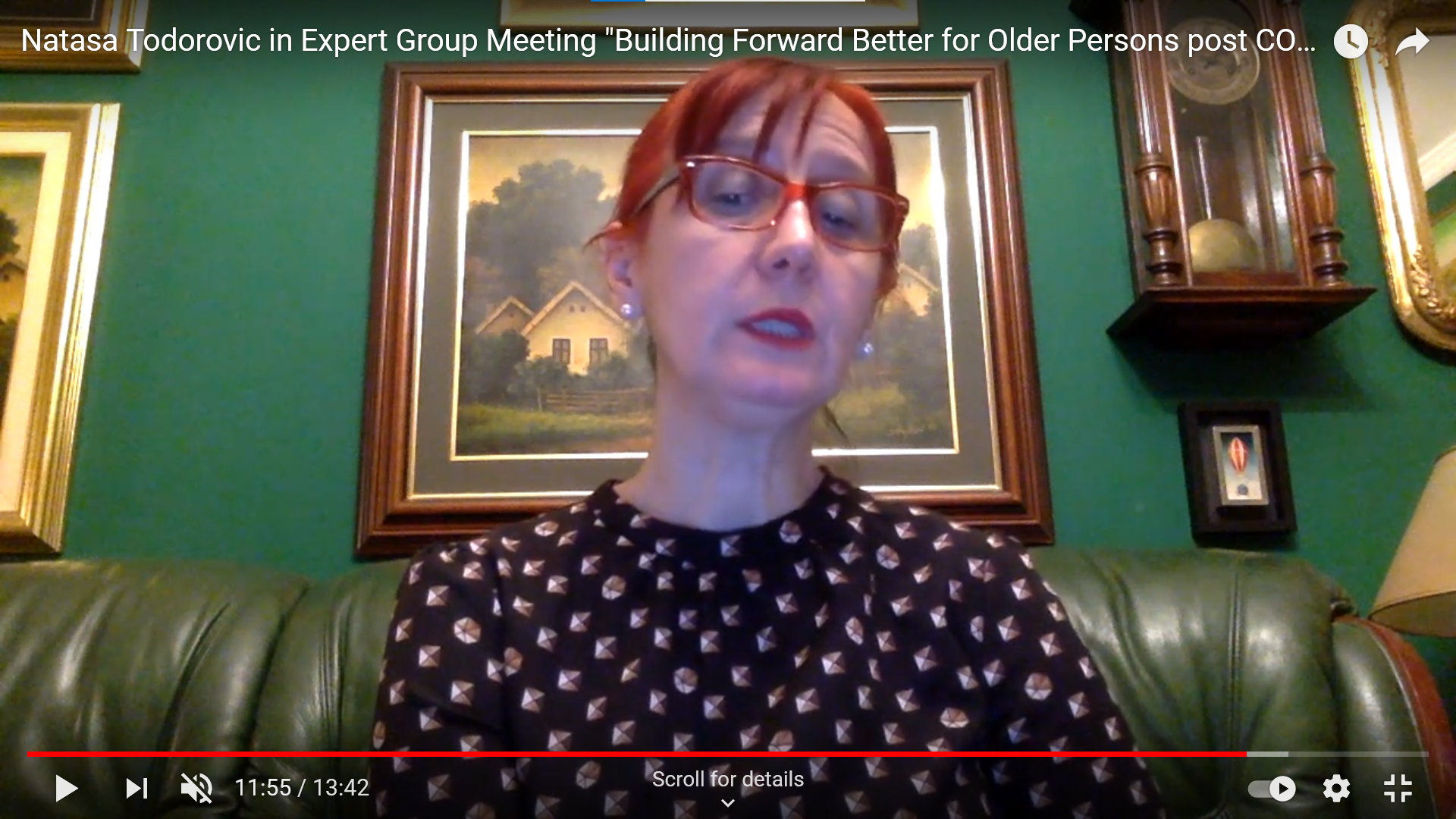- news
- participation of natasa todorovic in the expert meeting “building forward better for older persons post covid-19”
Participation of Natasa Todorovic in the Expert Meeting “Building Forward Better for Older Persons post COVID-19”

Invited by United Nations Programme on Ageing (UN DESA) Natasa Todorovic of the Red Cross of Serbia participated in the Expert Group Meeting on “Building Forward Better for Older Persons post COVID-19” between 2 and 5 March, online. The meeting brought together 20 experts including representatives of member states, civil society, academics and relevant stakeholders to explore and propose specific recommendations on how to ensure that ageing and older persons are adequately addressed, and actively engaged, in post-COVID 19 recovery efforts.
Natasa Todorovic covered the topic “Prevention and response to violence, abuse and neglect” under Session I “Economic and social Inclusion post COVID-19”. Her disscussion was entitled Wakeup call: Prevention and response to the violence, abuse and neglect and here are some highlights:
One of the lessons we have learned through the past year of the pandemic is that large scale emergencies such as this are, of course huge a global problem, but they are also a perfect storm of risk factors for elder abuse. One way of looking at it is to break it down to three main components. The first component is easy to understand. For older persons, social isolation is a known risk factor for experiencing elder abuse. Limited access to healthcare services they have received up to this point and to non-COVID healthcare – such as regular check-ups, diagnostics etc. – may lead to worsening health and decreasing their autonomy which may expose them to a higher risk of abuse. There is also a worry about financial issues with older persons having to spend more out of pocket funds to cover healthcare services because the system is not capable of meeting their needs during the epidemic. On top of that, they maybe have to use their pensions to financially support family members who lost their income, again due to the pandemic.
The other component is to do with informal and formal caregivers who are hit especially hard by the pandemic and the response measures. We know that informal caregivers are the backbone of any long-term care service system in the world, and during the pandemic they are faced with all the problems everyone else faces, such as risk of infection, movement restrictions, loss of income security etc. but on top of it they have all additional problems related to providing care to older persons.
The third component is widespread ageism, one of the root causes of elder abuse, with its prejudices and stereotypes about older persons. The mirror image of this is treating older population as homogeneous and denying its diversity, which prevents us from identifying those parts of this population who are under higher risk of abuse such as functionally dependent persons, older women, socially excluded older persons. During the pandemic, older persons across the world have been treated either with overly protective, paternalistic attitudes, or have been targets of unjust rage. Both sides of that coin are bad. Taking agency from older persons in the name of protection is just concealed force and then blaming older persons for declining economy during the pandemic is not just ageist but also completely wrong.
The COVID-19 pandemic should act as a wakeup call to include older persons in emergency response planning, budgeting, staff allocation and response activities, using their capacity and resources and voicing their concerns and recommendations. This should be normal, we shouldn’t have to even discuss it but this is still somehow an ideal rather than reality. But we have not awakened yet.
One year into the pandemic data collection is still blind to diversity of older population, measures and policies are still designed without meaningful participation of older persons, groups at higher risk still go unsupported, we still want to protect older persons without giving them a seat at the table. We talk about preserving economy while completely neglecting the large contribution older persons make to economy worldwide.
It is important to never forget that human rights do not expire as one ages and that older persons’ human rights must be protected to the full extent of the applicable law just as anyone else’s. A New UN Convention on Human Rights of Older Persons would be helping protect human rights of older persons at all levels and in all settings.
Link to the video of the statement: https://www.youtube.com/watch?v=3Yg0dgIXiBI&t=31s
